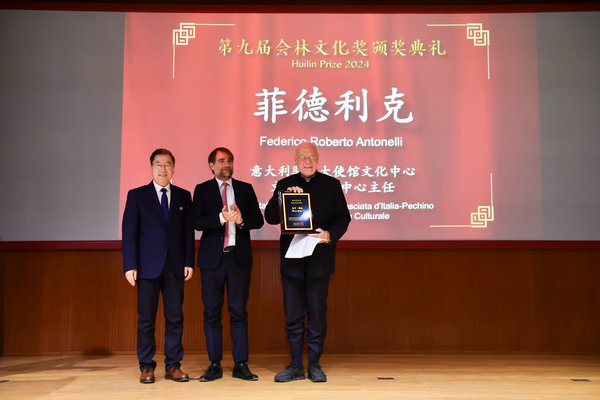

Falling for films
Mueller began exploring Chinese culture, history, and language in Italy when he was 16. In 1975, he arrived in Shenyang, capital of Liaoning province, to study literature at Liaoning University.
His studies, particularly under Professor Wang Xiangfeng, an expert in classical aesthetics, left a lasting impact on Mueller, who soon discovered Chinese films. He'd repeatedly watch classics like Tunnel Warfare and Mine Warfare. It was then that he recognized the unique traditions and excellence of Chinese cinema.
In 1977, he moved to Nanjing University in Jiangsu province, where one memorable summer day on a basketball court introduced him to Xie Jin's Red Detachment of Women, which ignited a genuine love for the director and for Chinese cinema.
Mueller believes that Xie not only studied global film trends, but also infused his films with an understanding of traditional Chinese opera and painting, and he sees the director's work as a representation of what he calls the "beauty of Eastern romanticism".
Their first encounter was in 1979 when Mueller, then still a relatively unknown foreigner, expressed a desire to meet the director, who agreed without hesitation.
"I'll never forget Xie's kindness," he says. "Once we became friends, every time I visited Shanghai, he would treat me to Shanghai cuisine. He never forgot to bring out his ageold Huangjiu or millet wine, since he is from Shaoxing, Zhejiang province, where it's known for the wine, and we'd sip the wine, enjoy drunken shrimp, and chat away."
When he visited the Beijing Film Academy to review films, Mueller took a keen interest in student work. He befriended some of the students who had joined the directing department in 1978, including Chen Kaige, Zhang Yimou, Li Shaohong, and Tian Zhuangzhuang.
As the students grew to become the fifth generation of Chinese directors, Mueller was able to follow their journey onto the international stage.
After returning to Italy in 1978, he realized that it was difficult to find good Chinese films abroad and he came up with the idea of hosting a Chinese film exhibition.
Understanding that language and cultural differences made it hard for many Europeans to enjoy Chinese films, Mueller devoted himself to translation.
To bring more films to the forefront, he searched worldwide for sources. He found a cache of almost 500 films in San Francisco's Chinatown and was able to obtain a significant collection of 1940s films from Havana's Chinatown, filling in the gaps left by incomplete copies in the Chinese Film Archive.
Over the course of two years, he found 135 films made between 1924 and 1981, and then organized his first big film festival in Turin, called Electric Shadows, to show them. The festival was the first such extensive screening of Chinese films abroad, and it attracted media coverage from all over the world.
From there, Mueller went on to work with major film festivals. From the Rotterdam International Film Festival to Locarno, and from Venice to Rome, he helped select films, and served as a producer and festival president, always championing Chinese cinema.
During his tenure as the director of the Venice International Film Festival from 2004 to 2011, Chinese films, as well as films produced or acted by Chinese people, have thrived. Three have received the Golden Lion for Best Film: Ang Lee's Brokeback Mountain and Lust, Caution, and Jia Zhangke's Still Life. John Woo has also received a Lifetime Achievement Award, and Deanie Ip won Best Actress for A Simple Life.
"Because of Chinese cinema, I feel compelled to continue dedicating my time to films, even to organizing large international film festivals," Mueller says.